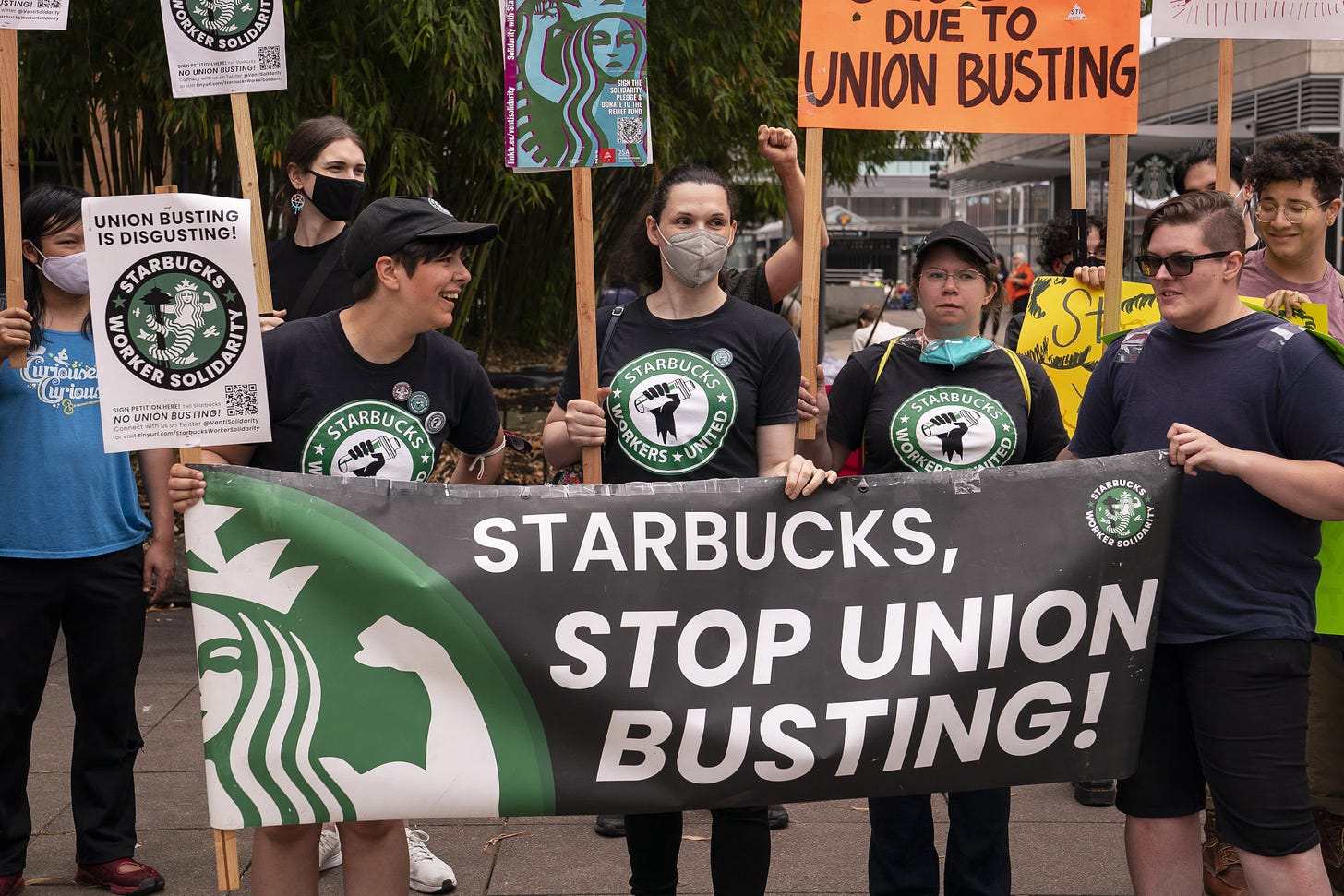04/18/2024: Another Starbucks Unfair Labor Practice
They keep racking them up.
Starbucks Corporation, 14-CA-321382 (Unpublished Board Decision)
The General Counsel alleged that Starbucks disparately enforced a rule against the distribution of materials against union supporters. The GC alleged this as a violation of both Sections 8(a)(1) and 8(a)(3). Starbucks filed a motion to dismiss on the Section 8(a)(3) violation, arguing that such conduct would only violate Section 8(a)(1) and also that the complaint in the case does not meet minimum pleading requirements. The Board denied this motion in a few sentences.
Starbucks Corporation, 373 NLRB No. 45, 20-CA-296184 (Published Board Decision)
In the underlying administrative law judge (ALJ) decision, the judge found that:
Starbucks unlawfully solicited employee grievances and promised to remedy them during the union campaign in a manner inconsistent with past practice. District Manager Ohia held systematic one-on-one meetings with employees after the union petition was filed where he solicited grievances and explicitly promised to personally remedy concerns, which was a significant departure from his previous casual interactions. This was similar to the employer's actions found unlawful in Mercedes-Benz of Orlando.
Starbucks unlawfully threatened employees with loss of benefits if they unionized, including saying they would lose the ability to pick up shifts at other stores and share products with other stores. Store Manager Rabbia made these threats to employee Saloma in an April 6 phone call. Although the language was somewhat equivocal, Rabbia did not explain the bargaining process or make clear any changes would only occur through good faith negotiations, as required under cases like Daikichi Sushi.
Starbucks unlawfully threatened that employees would not receive an anticipated pay raise if they unionized. Rabbia told Saloma a raise was coming but said she didn't want the employees to lose that and other benefits by unionizing. She did not mention the raise would be subject to bargaining.
The Board affirmed the ALJ’s decision.
As a remedy, the Board ordered Starbucks to cease and desist from the unlawful conduct, post a notice, and have the notice read aloud to employees by management or an NLRB agent. The Board cited its recent decision in WR Reserve explaining the rationale for notice reading remedies in serious cases.
Auto-Chlor System of Washington, Inc., 19-RC-338065 (Regional Election Decision)
The Regional Director dismissed the Teamsters petition to represent a unit of workers at Auto-Chlor because the Region is already pursuing a Cemex bargaining order for that unit.


That last order seems ripe for reversal. It's one thing to say that issuance of a complaint which seeks relief inherently inconsistent with a petition should result in dismissing that petition; quite another for a complaint which seeks relief CONSISTENT with a petition to result in dismissing it. That's perverse, and surely employees shouldn't be somehow punished for their employer's unfair labor practices by being locked out of representation for several years while the ULP case is pending. (Filing a new petition is a risky move-- if the second election results go against the union, that will likely deal a fatal blow to attempts to secure representation through a bargaining order-- but as long as the prounion employees understand that risk, the RD shouldn't paternalistically get in their way.)
There are a plethora of cases under the Gissel standard in which the Board issued bargaining orders even though the union had won the election (presumably because the employer was attempting to fight those election results). That-- not insisting on weirdly freezing the status quo-- is the correct result here.